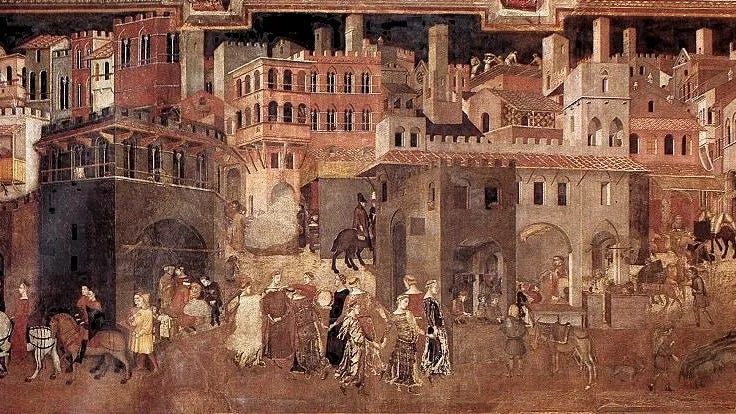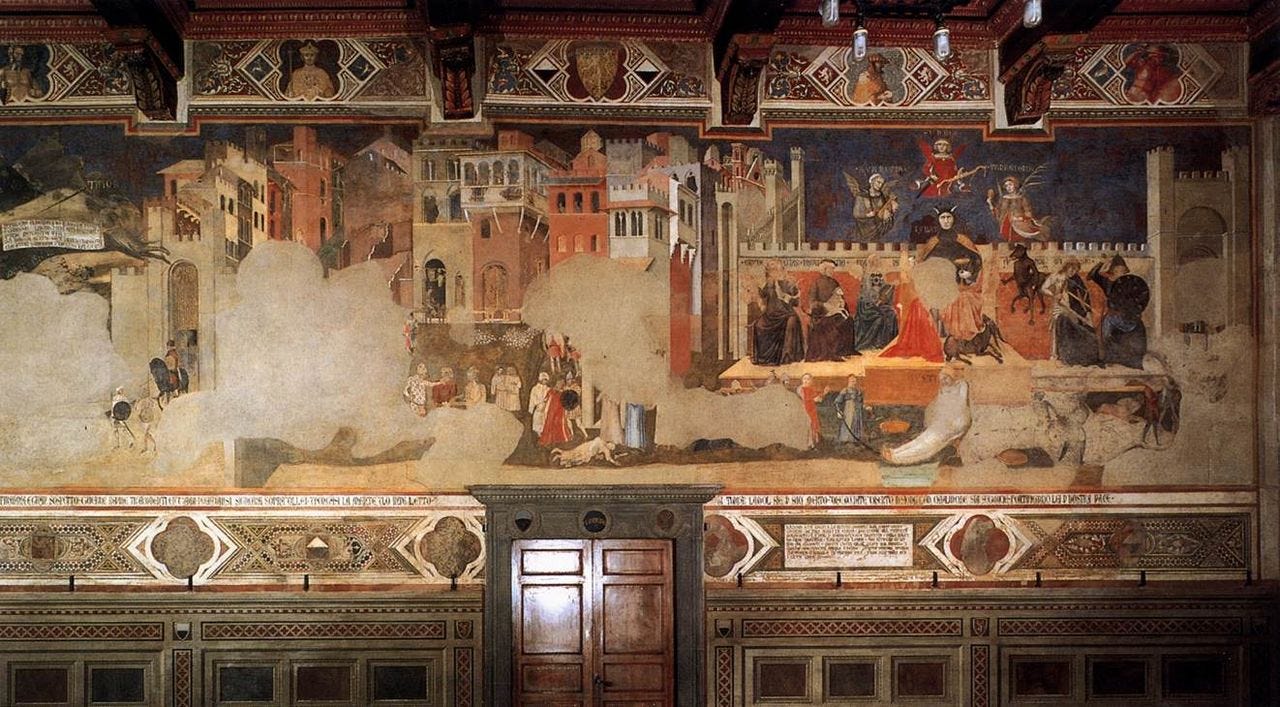Perfect World Disorder
Edward Feser writes on our political disorder—and how to end it.
I.
What is order? What is disorder? Let’s take the first question first; the answer to it will, naturally, yield an answer to the second. The classical and medieval understanding of order is nicely summed up in an old reference work beloved of us unreconstructed Thomists, Fr. Bernard Wuellner’s Dictionary of Scholastic Philosophy. He defines order as “the arrangement of many things into some unity according to some principle. The chief kinds are the order of parts to a whole and of means to one end.” The first of these kinds is not independent of the second. Something is part of a whole precisely by virtue of contributing to the realization of some end of that whole. For example, the lens is part of the eye insofar as it functions to focus the light the eye processes, where the eye in turn is part of an animal insofar as it allows it to see.
The traditional Aristotelian analysis of a thing in terms of its “four causes” provides further elucidation. The parts of a whole are its material cause, and their distinctive arrangement is its formal cause. That which brings the whole into being is its efficient cause, and the end for the sake of which the whole exists is its final cause. As Aquinas says, this end or final cause of a thing is “the cause of causes,” that which renders its other causes intelligible (Summa theologiae I.5.2). The lens is intelligible qua part of the eye only by reference to the end of focusing light; the eye is intelligible qua part of an animal only by reference to the end of allowing an animal to see; and so on. Take away the final cause, and you take away the intelligibility of the whole, and of the parts qua parts of the whole. You take away order.
A human being is both an order himself, and part of larger orders. In particular, and again to quote Aquinas:
Now there should be a threefold order in man: one in relation to the rule of reason, in so far as all our actions and passions should be commensurate with the rule of reason: another order is in relation to the rule of the Divine Law, whereby man should be directed in all things: and if man were by nature a solitary animal, this twofold order would suffice. But since man is naturally a civic and social animal, as is proved in [Aristotle’s] Politics i, 2, hence a third order is necessary, whereby man is directed in relation to other men among whom he has to dwell. (Summa Theologiae Ia-IIae.72.4)
Let’s consider these orders in turn, beginning with individual human beings themselves. Qua rational animals, the end toward which we are by nature directed is (according to the mainstream classical and medieval traditions) to know the true and the good. We are well-ordered to the extent that our lower appetites are subordinated to this pursuit. We are also parts of the overall cosmic order, with the existence and nature of its divine creator being the highest truths we can know, and service to him the highest good. Creation is well-ordered insofar as divine Providence works to ensure that the end for which it exists is realized, and good drawn out of even the worst evils introduced into it by disordered wills. The family is the primary manifestation of our social nature, and the state is a secondary natural manifestation. The latter’s function is to complete the meeting of our social needs by providing what smaller-scale social formations cannot, such as general law and order.
There are three fundamental sources of disruption parallel to these orders, famously known to Christian tradition as the world, the flesh and the devil. “The flesh” represents the most direct source of disruption to the order that is the individual human being himself. It comprises those forces that attack us from within ourselves—excessive or distorted passions that are insubordinate to reason, the vices that these can harden us into, and the corruption of reason itself when it becomes blind to the true and the good. “The devil,” of course, is that evil intelligence who seeks to ape God, and to disrupt the created order by turning it against the end for which it was made. “The world” represents malign forces within the social order that act to subvert it and to corrupt the individual human beings who make it up: crime; political corruption; false moral and religious ideologies; the commercialization of grave vice as with pornography, prostitution, and drug use; and so on.
Now, every order is given, by nature, a governing authority whose function it is to protect it against such disruptive forces by repressing them. Once again to quote Aquinas:
Now it is evident that all things contained in an order, are, in a manner, one, in relation to the principle of that order. Consequently, whatever rises up against an order, is put down by that order or by the principle thereof. And because sin is an inordinate act, it is evident that whoever sins, commits an offense against an order: wherefore he is put down, in consequence, by that same order, which repression is punishment.
Accordingly, man can be punished with a threefold punishment corresponding to the three orders to which the human will is subject. In the first place a man’s nature is subjected to the order of his own reason; secondly, it is subjected to the order of another man who governs him either in spiritual or in temporal matters, as a member either of the state or of the household; thirdly, it is subjected to the universal order of the Divine government. Now each of these orders is disturbed by sin, for the sinner acts against his reason, and against human and Divine law. Wherefore he incurs a threefold punishment; one, inflicted by himself, viz. remorse of conscience; another, inflicted by man; and a third, inflicted by God. (Summa theologiae Ia-IIae.87.1)
Because of these governing agencies, the presence of disruptive forces need not destroy an order. In a man whose rational faculties still function properly, conscience will lead him to resist the pull of the world, the flesh and the devil—or at least to repent when he has failed to resist. Hence the order that is the individual human being is maintained overall, despite the workings of these disruptive forces. In a healthy body politic, governments will repress both crime and those moral errors that are so egregious that they directly undermine the very stability of the family and the rest of the social order. And the Church, by way of her instruction, assists both individuals and governments in this task, remedying the defects in our understanding of natural law entailed by original sin.
Individual minds and governments guided by natural law are thus analogous to the body’s immune system. The immune system keeps illness at bay, or at least restores health after it has partially and temporarily been damaged. Thus the organism remains an order despite disruption to it. Similarly, the conscience of a good man, and the governance of sound public and ecclesiastical authorities, keep evil at bay, or at least suppress and correct it when it arises. Thus the individual soul and the social organism remain orderly despite the disruptive forces continually threatening them.
II.
Positive disorder will exist only if the governing agencies in question cease doing their job. Naturally, this is impossible in the case of divine providence. No matter what the disorder into which the rest of creation falls, providence will ensure that good is, in the long run, drawn out of it in such a way as to realize the end for which the world was made. But society and the individual human being can certainly fall into disorder. Conscience, the voice of reason, may no longer be audible to a man who has fallen into deeply habituated sin. A society can fall into anarchy by virtue of its governing authorities becoming too weak or unwilling to uphold law and order and sound morals.
But this is in fact only the beginning of disorder. Perfect or complete disorder exists when the governing forces of an order not only fail to do their job, but act positively contrary to it. It involves a kind of perversity—an authority’s active subversion of the order it governs, its attempt to frustrate rather than realize the end for the sake of which the order exists. This occurs in the individual human being when his mind is in thrall to an ideology that directs him to live contrary to the natural law, and in a society when its governing institutions are dominated by such an ideology. The Church, meanwhile, cannot entirely fall into such a perversion of governance, given the divine promise that the gates of Hell will never prevail against her. But something approximating this perverse misgovernance can occur temporarily if large numbers of bishops and other churchmen fall into heresy (as has occasionally occurred in Church history, such as during the Arian crisis).
Worst of all would be a scenario where radical disorientation of this kind exists in all of these orders at once—where large numbers of individual human beings are in thrall to an ideology contra naturam, where the governing authorities of states and other large-scale social institutions impose this malign ideology from above, and where even many churchmen cease resisting it or even sympathize with it themselves. This would be perfect world disorder. (I borrow this choice phrase from the Sneaker Pimps song “Velvet Divorce.” I trust that for some this can only lend extra heft to my analysis, given the modern intellectual’s love of pop culture allusions.)
Western civilization appears currently to be approaching something like this condition.





